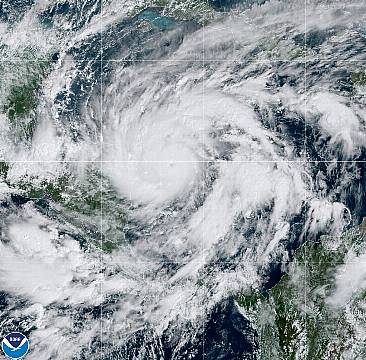Hurricane Eta is inching closer to Nicaragua’s Caribbean coast with potentially devastating winds, while heavy rain from the Category 4 storm is already causing rivers to overflow across Central America.
The hurricane has sustained winds of 145mph, and the US National Hurricane Centre said it is likely to maintain that strength until making landfall in the morning.
It is centred about 30 miles south-south-east of Puerto Cabezas, Nicaragua, and moving west-south-west at nearly 5mph. Hurricane-force winds are already blowing on land.
Hours after it had been expected to make landfall, Eta’s eye continued hovering just offshore.
10 AM EST Tuesday, November 3 Hurricane #Eta Key Messages: Extremely dangerous Eta expected to bring life-threatening storm surge, catastrophic winds, flash flooding, and landslides across portions of Central America. https://t.co/lQ8WhA2D3G pic.twitter.com/mW0ReBaBJw
Advertisement— National Hurricane Center (@NHC_Atlantic) November 3, 2020
The wind uprooted trees and ripped roofs apart, scattering corrugated metal through the streets of Bilwi, the main coastal city in the region. The city’s regional hospital abandoned its building, moving patients to a local school.
Early on Tuesday, Guillermo Gonzalez, director of the country’s emergency management agency, said in a news conference that as Eta began to make landfall there were reports of corrugated metal roofs flying off homes, trees, poles and power lines falling and rivers rising in the coastal area.
So far, there are no reported injuries or deaths, he said.
The storm is nearing landfall just south of Bilwi. About 10,000 people are in shelters in that city and an equal amount are sheltered in smaller towns across the region, he said. The area had already been lashed with strong winds and heavy rain for hours.
Authorities in Nicaragua and Honduras had moved people on Monday from outer islands and low-lying areas to shelters. Residents scrambled to shore up their homes, but few structures along Nicaragua’s remote Caribbean coast were built to withstand such force.
Nicaragua’s army moved red-helmeted troops specialising in search and rescue to Bilwi, the main coastal city in an otherwise remote and sparsely populated area.
The navy spent Monday ferrying residents of coastal islands to shelters in Bilwi, also known as Puerto Cabezas.
On television on Monday, Nicaragua vice president and first lady Rosario Murillo prayed for God to protect the country. She said Nicaragua would apply lessons learned from previous storms. “How many hurricanes have come and we have moved on, thanks to God,” she said.
Along Honduras’s northern Caribbean coast, torrential rains from Eta’s outer bands caused some rivers to overwhelm their banks on Monday, forcing evacuations.
This could be only the beginning of Eta’s destruction. The storm is forecast to spend the week meandering over Central America dumping rain measured in feet not inches.
Forecasters said central and northern Nicaragua into much of Honduras could get 15in to 25in of rain, with 35in in isolated areas.
Heavy rain is also likely in eastern Guatemala, southern Belize and Jamaica.
A storm surge of around 15ft above normal tides is possible for the coast of Nicaragua, forecasters said.







